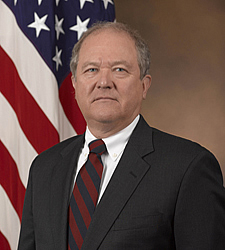White House, Congress Arguing Over Which Senate Committee Should Fail in Drone Oversight
Ken Dilanian has a very interesting article in the Los Angeles Times outlining the latest failure in Congress’ attempts to exert oversight over drones. Senator Carl Levin had the reasonable idea of calling a joint closed session of the Senate Armed Services and Intelligence Committees so that the details of consolidating drone functions under the Pentagon (and helping the CIA to lose at least one of its paramilitary functions) could be smoothed out. In the end, “smooth” didn’t happen:
An effort by a powerful U.S. senator to broaden congressional oversight of lethal drone strikes overseas fell apart last week after the White House refused to expand the number of lawmakers briefed on covert CIA operations, according to senior U.S. officials.
Sen. Carl Levin (D-Mich.), who chairs the Armed Services Committee, held a joint classified hearing Thursday with the Senate Intelligence Committee on CIA and military drone strikes against suspected terrorists.
But the White House did not allow CIA officials to attend, so military counter-terrorism commanders testified on their own.
But perhaps the White House was merely retaliating for an earlier slight from Congress:
In May, the White House said it would seek to gradually move armed drone operations to the Pentagon. But lawmakers added a provision to the defense spending bill in December that cut off funds for that purpose, although it allows planning to continue.
Dilanian parrots the usual framing of CIA vs JSOC on drone targeting:
Levin thought it made sense for both committees to share a briefing from generals and CIA officials, officials said. He was eager to dispel the notion, they said, that CIA drone operators were more precise and less prone to error than those in the military.
The reality is that targeting in both the CIA and JSOC drone programs is deeply flawed, and the flaws lead directly to civilian deaths. I have noted many times (for example see here and here and here) when John Brennan-directed drone strikes (either when he had control of strike targeting as Obama’s assassination czar at the White House or after taking over the CIA and taking drone responsibility with him) reeked of political retaliation rather than being logically aimed at high value targets. But those examples pale in comparison to Brennan’s “not a bake sale” strike that killed 40 civilians immediately after Raymond Davis’ release or his personal intervention in the peace talks between Pakistan and the TTP. JSOC, on the other hand, has input from the Defense Intelligence Agency, which, as Marcy has noted, has its own style when it comes to “facts”. On top of that, we have the disclosure from Jeremy Scahill and Glenn Greenwald earlier this week that JSOC will target individual mobile phone SIM cards rather than people for strikes, without confirming that the phone is in possession of the target at the time of the strike. The flaws inherent in both of these approaches lead to civilian deaths that fuel creation of even more terrorists among the survivors.
Dilanian doesn’t note that the current move by the White House to consolidate drones at the Pentagon is the opposite of what took place about a year before Brennan took over the CIA, when his group at the White House took over some control of JSOC targeting decisions, at least with regard to signature strikes in Yemen.
In the end, though, it’s hard to see how getting all drone functions within the Pentagon and under Senate Armed Services Committee oversight will improve anything. Admittedly, the Senate Intelligence Committee is responsible for the spectacular failure of NSA oversight and has lacked the courage to release its thorough torture investigation report, but Armed Services oversees a bloated Pentagon that can’t even pass an audit (pdf). In the end, it seems to me that this entire pissing match between Congress and the White House is over which committee(s) will ultimately be blamed for failing oversight of drones.

